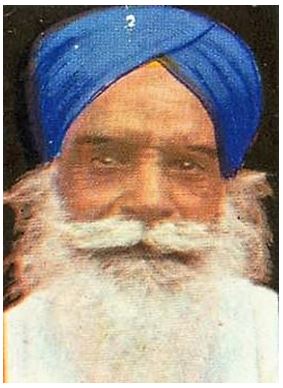KHARAK SINGH, BABA

Baba Kharak Singh (6.6.1868 – 6.10.1963), son of Bhai Hari Singh, was born at Sialkot (Pakistan). His father was a rich industrialist and construction contractor. In 1889, he passed his Bachelors degree from Lahore and joined Law studies at Allahabad. Due to the death of his father he had to abandon his studies. His first job was as the Secretary of the Sialkot Municipal Committee. He could not continue his job for a long time. Kharak Singh was elected the President of the Singh Sabha Sialkot and Khalsa High School Sialkot. In 1912, the Sikh Educational Conference was held at Sialkot. He was selected as the chairman of the reception committee. In 1915, he presided over the Sikh Educational Conference, held at Tarn Taran. In October 1920, Kharak Singh was elected the president of the Sikh League (formed in 1919). He was one of the senior most leaders of the Gurdwara Reform Movement (1920-1926). On August 14, 1921, he was elected the president of the S.G.P.C. His first arrest was in 1920 and since then he was arrested several times. He spent 20 years of his life in jails. Kharak Singh’s fame was at its zenith when (after forcible taking over of the control of the keys of the treasury of the Darbar Sahib) he was presented the keys of Darbar Sahib, on January 17, 1922. On April 4, 1922, he was arrested again. He was released on June 4, 1927. He was elected president of the first S.G.P.C. elected under the Gurdwara Act. He was presented Siropao (robe of honour) at Akal Takht Sahib. In 1928, Nehru Report was published. It was against the political and religious interests of the Sikh nation. The Sikhs rejected it but the Hindu leaders did not bother for the Sikhs. In 1929, the Congress Party held its session at Amritsar. The Sikhs too held their Conference during the same period, at Amritsar. The success of the Sikh procession put the Congress show into shame and shade. As a result the Congress had to throw the Nehru Report into waste box. The Congress Party, however, planned to weaken Kharak Singh who was opposed to the Congress on various issues concerning the Sikhs. In 1930-31, Master Tara Singh replaced Kharak Singh. Kharak Singh continued his policies till 1939. During this period he became president of Central Akali Dal, which could not become an organisation of the masses. This led him to side with the Congress, which, he felt earlier, was an enemy of the Sikh nation. He spent his last days almost in isolation. In his earlier days he was known as Betaj Badshah (King without a crown). His major drawback was his stubborn nature. His early career as a Sikh politician was a glorious one. He died in isolation.
(Dr Harjinder Singh Dilgeer)